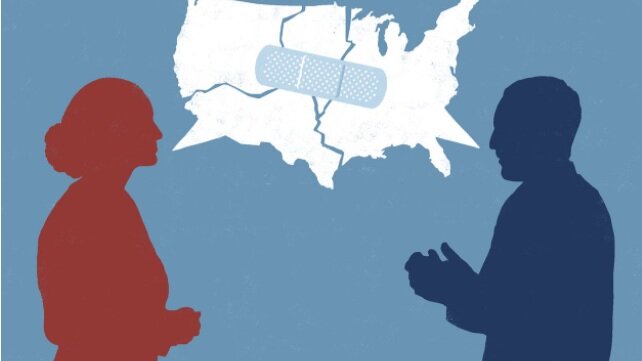On October 7, 2023, Hamas — a Palestinian militant group — invaded Israel, ruthlessly killing, raping, torturing, and kidnapping more than 1,160 Israelis. In a spurt of rage, millions rushed to social media and posted messages proclaiming, “We Stand Behind Israel”. Less than a month later, many of those millions deleted their posts, replacing them with messages saying, “We Support Palestine” and condemning Israel’s near-genocidal invasion of Gaza. Even now, this conflict continues as Israel razes Gaza, prompting large-scale protests against funding Israel at colleges across America, with some of the most prominent being at Columbia University and UCLA.
This wide-scale clash of views has created a volatile situation that echoes similarities to the Black Lives Matter Movement and COVID-19 pandemic, which both sparked country-wide protests, riots, and stand-offs between police and citizens. In all these examples, polarization split the public into two extremes, with both believing themselves to have the moral high ground. As heated debates and fights arise regarding the ethics of the controversial Israel-Hamas War, many have been left to wonder; What exactly polarized America’s views to the point of no return?
Data from surveys by Global Web Index, a market research company, show that as of April 2024, 5.07 billion people or 62.3% of the world’s population use social media. A simple look at these popular social media platforms like Instagram and X (formerly Twitter), reveals a drastically polarized community, with two sides both having extreme views on the Israel-Hamas War. From comment sections to video posts, these online communities are rife with blatant racism, blind support, and misinformation on both sides. The combination of these issues results in two separate extremes: one side that fervently defends Israel’s actions in the war and another that fiercely attacks Israel and demands support for Palestine.
One main source of polarization is the sophisticated algorithm that all social media platforms use to prolong user engagement. The algorithm views user data like actions, behaviors, and interests and moderates content recommendations based on what users like or interact with. This personalization results in an endless cycle of content that constantly feeds users what they want to see while limiting user exposure to viewpoints contrary to their own.
In the context of a controversial topic like the Israel-Hamas War, this means that pro-Palestine users will only see pro-Palestine content, and pro-Israel users will only see pro-Israel content. This isolation within social media fuels hostility between the two sides and causes millions to support a movement without having proper knowledge of the opposing side. As a result, social media platforms — sites designed to bring people together — end up tearing communities apart.
However, that’s not to say that social media platforms are entirely at fault. Most users on social media view content that leads them to support a cause, but they fail to research more about the cause they’re supporting and the other side that they viciously condemn. By not independently researching these topics, many people fall victim to misinformation and propaganda. Without proper knowledge of both sides of a conflict, how can anyone validly support either side?
In the context of the Israel-Hamas War, a lack of research means that most people aren’t educated on the complex history of Israel and Palestine, which contains details that would almost certainly influence views on the matter. The modern generation popularizes taking initiative and swiftly committing support to movements. While the conviction of these people may be admirable, both sides lose their moral high ground by failing to research all aspects of the conflict, instead choosing to blindly support either side.
Furthermore, the largely unmoderated social media platforms have become breeding grounds for unverified news, propaganda, censorship, and misinformation that escalates tensions. This misinformation and censorship coupled with gullible users significantly influences public perception of the Israel-Hamas War, directly providing false or radical ideas to users. In actuality, content circulating on social media very poorly represents the events of the October 7 attack in Israel and Israel’s current invasion of Gaza. It’s nearly impossible for social media content on the war to be unbiased, as most people posting this content discreetly incorporate their own opinions into their posts.
In March 2020, the American Economic Association (AEA) performed a randomized experiment where test subjects deactivated their Facebook accounts for four weeks to determine social media’s effects on polarization. The results showed that staying off the platform “significantly reduced polarization of views on policy issues and a measure of exposure to polarizing news.” The AEA’s study directly proves that extreme polarization can be avoided by staying off social media platforms.
Although social media may be enjoyable when viewing silly posts or keeping up with friends, the detrimental effects of using these platforms have become increasingly evident as conflicts across the country exacerbate. Reforms must be made to social media platforms to combat polarizing algorithms, misinformation, and censorship or America risks turning into a political warzone like never before.


